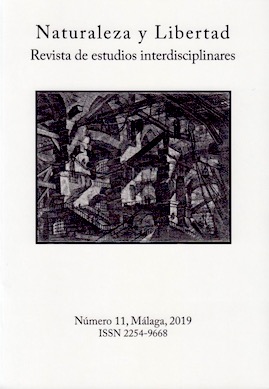EL MONISMO NEUTRAL y la superación de la dualidad mente-materia
DOI:
https://doi.org/10.24310/NATyLIB.2019.v1i11.5576Keywords:
Mente, materia, cerebro, monismo, neutral, emergente, sistemismo, qualia,Abstract
El monismo neutral afirma que tanto mente como materia son categorías derivadas de una única realidad subyacente que no se identifica exclusivamente con ninguna de ellas. En el presente trabajo se formula un esbozo de teoría desde la perspectiva del monismo neutral sobre las dis-tintas configuraciones de la realidad que denominamos “mente” y “materia”, discutiendo asimismo sus consecuencias y los planteamientos a que podría dar lugar.
Downloads
Metrics
References
D. Abbott et al., Quantum Aspects of Life, London, Imperial College Press, 2008.
R. Alemañ, “Epistemologic controversy on quantum operators”, en: Principia. In-ternational Journal of Epistemology, 2010 (14): 241-253.
R. Alemañ, “La relación mente-materia y el monismo neutral”, en: Naturaleza y Libertad, Revista de filosofía y estudios interdisciplinares, 2012 (1): 16-50.
R. Alemañ, “Actualidad y vigencia del monismo neutral”, en: Naturaleza y Liber-tad. Revista de filosofía y estudios interdisciplinares, 2013 (2): 11-25.
J. Arana, La conciencia inexplicada. Ensayo sobre los límites de la comprensión naturalista de la mente, Madrid, Biblioteca Nueva, 2015.
D. Blitz, Emergent evolution. Qualitative novelty and the levels of reality, Dor-drecht, Kluwer, 1992.
M. Bunge, Foundations of Physics, New York, Springer, 1967.
M. Bunge, Scientific materialism, Dordrecht, Reidel, 1981.
M, Bunge, Filosofía de la física, Barcelona, Ariel, 1984.
M. Bunge, El problema mente-cerebro, Madrid, Tecnos, 1985.
M. Bunge, R. Ardila, Filosofía de la psicología, Barcelona, Ariel, 1988.
M. Bunge, Emergencia y Convergencia. Novedad cualitativa y unidad del conoci-miento, Barcelona, Gedisa, 2014.
A. Carsetti (ed.), Causality, Meaningful Complexity and Embodied Cognition, New York, Springer, 2010.
R. D’Andrade, The Development of Cognitive Anthropology, New York, Cambridge University Press, 2003.
J. Eccles, La psique humana, Madrid, Tecnos, 1986.
J. Fetzer, Epistemology and Cognition, Boston, Kluwer, 1991.
M. Friedman, Fundamentos de las teorías del espacio-tiempo, Madrid, Alianza, 1991.
D. Gillespie, Introducción a la mecánica cuántica, Barcelona, Reverté, 1976.
G. Globus, The Transparent Becoming of World. A crossing between process phi-losophy and quantum neurophilosophy, Philadelphia, J. Benjamins Publ. Co., 2009.
G. Leibniz, Monadología, Madrid, Biblioteca Nueva, 2001.
H. Leitgeb, Inference on the Low Level. An investigation into deduction, Nonmono-tonic Reasoning and the Philosophy of Cognition, Boston, Kluwer, 2004.
J. Martínez, “El problema mente-cerebro: sus orígenes cartesianos”, en: Contras-tes. Revista Interdisciplinar de Filosofía, 1 (1996): 191-210.
A. Pais, El Señor es sutil… La ciencia y la vida de Albert Einstein, Barcelona, Ariel, 1982.
R. Penrose, La nueva mente del emperador, Barcelona, Mondadori, 1991.
R, Penrose, El camino a la realidad. Una guía completa de las leyes del universo, Madrid, Debate, 2006.
Downloads
Published
How to Cite
Issue
Section
License
Those authors who have publications with this journal, accept the following terms:
1. Copyright and licensing information are clearly described on the journal’s web site: all content published in Naturaleza y Libertad is open acces without limit, and are subject to the Attribution-NonCommercial-ShareAlike 4.0 International (CC BY-NC-SA 4.0) license. The full text of which can be consulted at https://creativecommons.org/licenses/by-nc-sa/4.0/
2. It is the responsibility of the authors to obtain the necessary permissions for the images that are subject to copyright. The authors whose contributions are accepted for publication in this journal will retain the non-exclusive right to use their contributions for academic, research and educational purposes, including self-archiving or deposit in open access repositories of any kind. The electronic edition of this magazine is edited by the Editorial de la University of Malaga (UmaEditorial), being necessary to cite the origin in any partial or total reproduction.
3. This journal allows and encourages authors to publish papers on their personal websites or in institutional repositories, both before and after their publication in this journal, as long as they provide bibliographic information that accredits, if applicable, your posting on it.
4. In no case will anonymous papers be published.





18.png)













